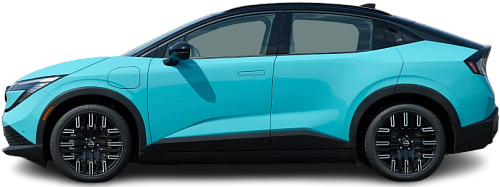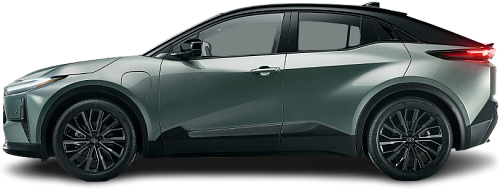USA EV Comparison: Nissan Leaf 52 kWh vs Toyota C-HR+ 57.7 kWh FWD
Struggling to Decide? Let AI Help!
Your AI Summary Is Ready!
General Info
Both vehicles have been announced, but are not yet in production. Both cars are expected to be sold in the United States.
The two vehicles share the same body style: SUV.
| Property | Nissan Leaf 52 kWh | Toyota C-HR+ 57.7 kWh FWD |
|---|---|---|
| Years of Production | 2025-… | 2025-… |
| Current Status | Announced | Announced |
| Country of Manufacture | Japan, UK, USA | Japan, China |
| Body Style | SUV | SUV |
| Market Availability | EU, USA | EU, USA |
| Price USA (New) | $35000 | - Price USA (New) |
| GCC Score | 5.6 | 6 |
Range and Efficiency
While the Toyota C-HR+ 57.7 kWh FWD (2025-…) offers a longer real-world range and a bigger battery, it is less energy-efficient than the Nissan Leaf 52 kWh (2025-…).
| Property | Nissan Leaf 52 kWh | Toyota C-HR+ 57.7 kWh FWD |
|---|---|---|
| Range (EPA) | 250 mi | - Range (EPA) |
| Range (WLTP) | - Range (WLTP) | 283 mi |
| Range (GCC) | 237 mi | 240 mi |
| Battery Capacity (Nominal) | 52 kWh | 57.7 kWh |
| Battery Capacity (Usable) | 49.4 kWh | 51.9 kWh |
| Efficiency per 100 mi | 20.8 kWh/100 mi | 21.6 kWh/100 mi |
| Efficiency per kWh | 4.8 mi/kWh | 4.62 mi/kWh |
| Range and Efficiency Score | 8.1 | 8.1 |
Charging
Both vehicles utilize a standard 400-volt architecture.
Both vehicles support DC fast charging with a maximum power of 150 kW.
The Toyota C-HR+ 57.7 kWh FWD (2025-…) features a more powerful on-board charger, supporting a maximum AC charging power of 11 kW, whereas the Nissan Leaf 52 kWh (2025-…) is limited to 7.2 kW.
| Property | Nissan Leaf 52 kWh | Toyota C-HR+ 57.7 kWh FWD |
|---|---|---|
| Max Charging Power (AC) | 7.2 kW | 11 kW |
| Max Charging Power (DC) | 150 kW | 150 kW |
| Architecture | 400 V | 400 V |
| Charge Port | Tesla (NACS) | Tesla (NACS) |
| Charging Score | 4.6 | 5.9 |
Performance
Both vehicles are front-wheel drive.
The Nissan Leaf 52 kWh (2025-…) boasts greater motor power and accelerates faster from 0 to 60 mph.
| Property | Nissan Leaf 52 kWh | Toyota C-HR+ 57.7 kWh FWD |
|---|---|---|
| Drive Type | FWD | FWD |
| Motor Type | PMSM | PMSM |
| Motor Power (kW) | 130 kW | 123 kW |
| Motor Power (hp) | 174 hp | 165 hp |
| Motor Torque | 254 lb-ft | 168 lb-ft |
| 0-60 mph | 7.2 s | 8.3 s |
| Top Speed | 90 mph | 99 mph |
| Performance Score | 3.3 | 3 |
Dimensions
The Toyota C-HR+ 57.7 kWh FWD (2025-…) is longer, wider, and taller.
The Toyota C-HR+ 57.7 kWh FWD (2025-…) boasts a more extended wheelbase.
| Property | Nissan Leaf 52 kWh | Toyota C-HR+ 57.7 kWh FWD |
|---|---|---|
| Length | 173.4 in | 178 in |
| Width (with Mirrors) | 82.6 in | - Width (with Mirrors) |
| Width (w/o Mirrors) | 71.3 in | 73.6 in |
| Height | 61.3 in | 62.8 in |
| Wheelbase | 105.9 in | 108.3 in |
Cargo and Towing
Neither car is equipped with a frunk (front trunk).
Neither vehicle is officially rated for towing in the US.
| Property | Nissan Leaf 52 kWh | Toyota C-HR+ 57.7 kWh FWD |
|---|---|---|
| Number of Seats | 5 | 5 |
| Curb Weight | 3955 lb | - Curb Weight |
| Cargo Volume (Trunk) | 20 ft3 | 14.7 ft3 |
| Cargo Volume (Max) | 55.5 ft3 | - Cargo Volume (Max) |
| Cargo Volume (Frunk) | - Cargo Volume (Frunk) | - Cargo Volume (Frunk) |
| Towing Capacity | - Towing Capacity | - Towing Capacity |
| Cargo and Towing Score | 5.8 | 6.3 |




